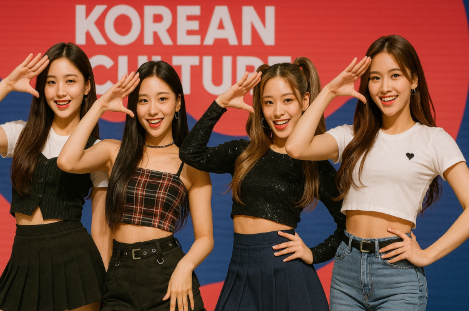South Korea is renowned for its extraordinary contribution to the global music industry, predominantly through K-Pop. However, the musical landscape of Korea extends far beyond this genre, offering a rich tapestry of traditional sounds, contemporary fusion, and innovative performances. This article delves into the multifaceted world of music in South Korea, discussing its traditional roots, modern influences, and the global impact of its industry.
The Roots of Korean Traditional Music
Korean traditional music, or “gugak,” forms the cultural bedrock of South Korea’s musical heritage. This term encompasses various forms, including court music, folk music, and religious music. Instruments such as the gayageum (a zither-like string instrument), janggu (an hourglass-shaped drum), and piri (a type of bamboo flute) are intrinsic to traditional performances.
Gugak is often subdivided into “jeongak,” which represents music played in court, and “minsokak,” denoting folk music shared amongst the common people. Concerts and educational programs across the country promote these sounds, making them accessible and appreciated by modern audiences.
Contemporary Influences and Innovations
While traditional music lays the foundation, contemporary Korean music integrates various global influences, resulting in innovative genres such as K-Pop, K-Rock, and K-Hip Hop. The infusion of western styles with traditional beats has fashioned a unique soundscape that resonates worldwide.
Artists are celebrated for their ability to fuse genres, such as indie bands merging folk elements with electronic music or hip-hop artists incorporating traditional drum patterns. This eclectic mix has fostered an environment ripe for musical experimentation and growth.
The Global Phenomenon of K-Pop
K-Pop has surged in popularity on a global scale, characterized by its catchy tunes, synchronized dance routines, and polished aesthetics. Groups like BTS, BLACKPINK, and EXO have captivated international fans, leading to sold-out world tours and millions of social media followers.
The accessibility of streaming services, combined with the strategic use of social media, catapulted K-Pop into the global consciousness, transforming it into more than just a music genre but a cultural movement.
Live Music Scene in South Korea
South Korea boasts a vibrant live music scene, with venues ranging from intimate clubs in Seoul’s Hongdae district to massive arenas like the Gocheok Sky Dome. These venues host regular performances spanning all genres, catering to diverse musical tastes.
Festivals such as the Seoul World DJ Festival and Incheon Pentaport Rock Festival further highlight live music’s significance, attracting international acts and audiences, thereby nourishing a thriving, dynamic music culture.
Educational Efforts and Musical Institutions
The Korean government and various institutions place significant emphasis on music education, supporting the growth of future musical talent. The Korea National University of Arts and various music conservatories provide rigorous training in both traditional and contemporary music.
Such institutions not only nurture local artists but also draw international students, contributing to the global exchange of musical ideas and enhancing Korea’s role as a musical hub.
| Style | Examples | Features |
|---|---|---|
| Traditional Music (Gugak) | Arirang, Pungmul | Singular vocals, Traditional instruments |
| K-Pop | BTS, BLACKPINK | Pop melodies, Dance routines |
| K-Hip Hop | Jay Park, Zico | Rap and beats, Urban aesthetics |
| Fusion | Jambinai, Leenalchi | Blend of traditional and modern |
FAQ
Q: What makes Korean traditional music unique?
A: It is unique due to its use of traditional instruments and vocal styles that often convey historical and cultural stories, creating a distinct sound not found in Western music.
Q: How has K-Pop influenced global music trends?
A: K-Pop has influenced global music by setting new standards for production quality and integrating visual elements into performances, impacting how music is marketed and consumed worldwide.
Q: Are there any Korean music festivals worth attending?
A: Yes, notable festivals include the Seoul World DJ Festival and the Incheon Pentaport Rock Festival, both offering diverse lineups and lively atmospheres.
✅ Korean traditional music, known as Gugak, forms an essential part of Korea’s cultural heritage.
✅ Modern Korean music genres skillfully blend traditional and global influences.
✅ K-Pop stands out globally for its production values and engaging performances.
✅ South Korea’s live music scene is diverse and dynamic, appealing to a wide range of audiences.
✅ Music education remains a key focus, fostering new talent and innovation within the industry.
#KoreanMusic #Gugak #KPop #BTS #BLACKPINK #KoreanCulture #TraditionalMusic #KoreanInstruments #SeoulMusic #LiveMusicSeoul #KoreanFestivals #IncheonPentaport #SeoulWorldDJFestival #KoreanHipHop #JayPark #Zico #MusicEducationKorea #KoreanUniversityofArts #FusionMusic #Jambinai #Leenalchi #KoreanMusicalInnovations #GlobalKpop #KoreanMusicalHeritage #HongdaeLiveMusic #GocheokSkyDome #MusicInKorea #KoreanMusicians #SeoulMusicScene
